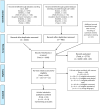The effects of different types of organisational workplace mental health interventions on mental health and wellbeing in healthcare workers: a systematic review
- PMID: 38695906
- PMCID: PMC11130054
- DOI: 10.1007/s00420-024-02065-z
The effects of different types of organisational workplace mental health interventions on mental health and wellbeing in healthcare workers: a systematic review
Abstract
Objective: To determine if and which types of organisational interventions conducted in small and medium size enterprises (SMEs) in healthcare are effective on mental health and wellbeing.
Methods: Following PRISMA guidelines, we searched six scientific databases, assessed the methodological quality of eligible studies using QATQS and grouped them into six organisational intervention types for narrative synthesis. Only controlled studies with at least one follow-up were eligible.
Results: We identified 22 studies (23 articles) mainly conducted in hospitals with 16 studies rated of strong or moderate methodological quality. More than two thirds (68%) of the studies reported improvements in at least one primary outcome (mental wellbeing, burnout, stress, symptoms of depression or anxiety), most consistently in burnout with eleven out of thirteen studies. We found a strong level of evidence for the intervention type "Job and task modifications" and a moderate level of evidence for the types "Flexible work and scheduling" and "Changes in the physical work environment". For all other types, the level of evidence was insufficient. We found no studies conducted with an independent SME, however five studies with SMEs attached to a larger organisational structure. The effectiveness of workplace mental health interventions in these SMEs was mixed.
Conclusion: Organisational interventions in healthcare workers can be effective in improving mental health, especially in reducing burnout. Intervention types where the change in the work environment constitutes the intervention had the highest level of evidence. More research is needed for SMEs and for healthcare workers other than hospital-based physicians and nurses.
Keywords: Burnout; Effectiveness; Job stress intervention; Small-to-medium size enterprise; Wellbeing; Workplace mental health intervention.
© 2024. The Author(s).
Conflict of interest statement
The authors have no competing interests to declare that are relevant to the content of this article.
References
-
- Arensman Ella, Leduc Mallorie, O’Brien Clíodhna, et al. Implementation and evaluation of a multi-level mental health promotion intervention for the workplace (MENTUPP): study protocol for a cluster randomised controlled trial. Trials. 2023;24:621. doi: 10.1186/s13063-023-07537-0. - DOI - PMC - PubMed
Publication types
MeSH terms
Grants and funding
LinkOut - more resources
Full Text Sources
Medical


